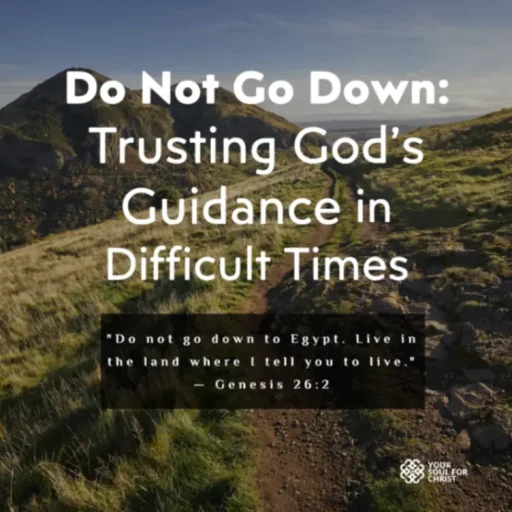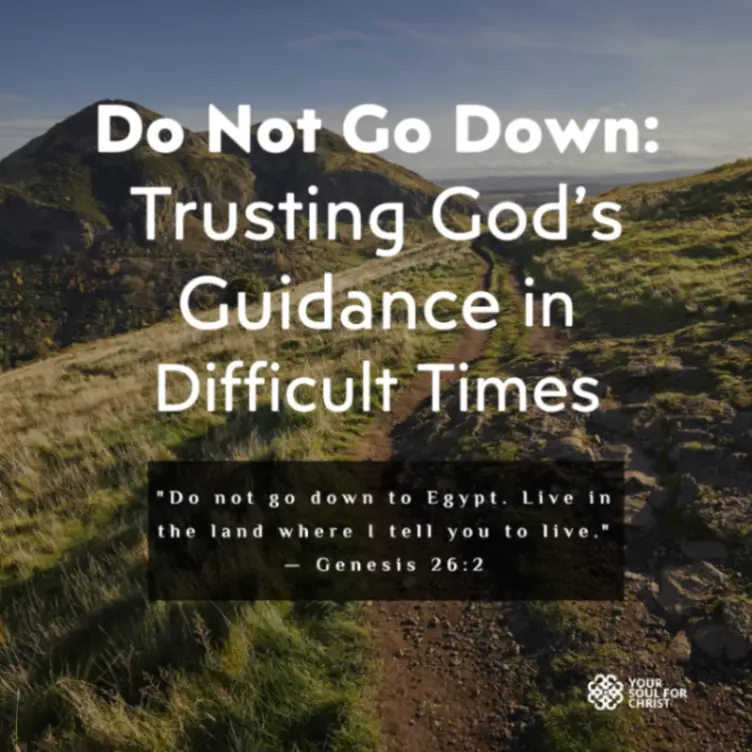The Lord appeared to Isaac and said, “Do not go down to Egypt; live in the land where I tell you to live. Stay in this land for a while, and I will be with you and will bless you. For to you and your descendants I will give all these lands and will confirm the oath I swore to your father Abraham.”
Genesis 26:2-3 NIV
In Genesis 26:1–6, we encounter a pivotal moment in Isaac’s life during a severe famine. Faced with hardship, Isaac could have followed his father Abraham’s example by seeking refuge in Egypt. However, God appeared to Isaac with a clear command: “Do not go down to Egypt. Live in the land where I tell you to live” (Genesis 26:2). This instruction emphasises the importance of trusting God’s guidance, even when the circumstances seem overwhelming or uncertain. The message “do not go down” serves as a powerful reminder to remain in God’s will, rather than pursuing human solutions that may lead us away from His plans.
Isaac obeyed God’s directive and stayed in Gerar, a land still within Canaan but affected by the famine. This act of obedience demonstrated his faith and trust in God’s promises. Despite the scarcity of resources, Isaac relied on God’s assurance: “I will be with you and will bless you” (Genesis 26:3). This shows that the presence of God is far more valuable than the comforts of material abundance. God’s blessings are tied to our obedience and willingness to follow His guidance. “Do not go down” is not merely a physical instruction but a spiritual call to resist relying on our own understanding or strength.
God also used this moment to reaffirm His covenant with Isaac, the same covenant He had made with Abraham. He promised numerous descendants and blessings for all nations through Isaac’s lineage. This demonstrates God’s faithfulness and the unchanging nature of His promises.
Furthermore, the instruction to not go down to Egypt carries symbolic significance as well. Egypt, while a literal nation, represents disobedience, self-reliance, and separation from God. The phrase warns against stepping outside of God’s plan. It is a warning to avoid pursuing solutions that prioritise physical comfort over spiritual obedience or neglecting to seek His guidance in challenging times.
Meanwhile, one does not need to physically relocate to “go down to Egypt”. It can happen when we ignore God’s instructions, isolate ourselves from His presence, or pursue personal ambitions over His divine purpose. The story of Isaac reminds us to stay where God has placed us, even in difficult situations. Obedience ensures His presence and blessings.
As believers, the temptation to “go down to Egypt” may appear in various forms. For example, choosing an easier path, relying on our own plans, or stepping outside of God’s will. Yet, God’s call remains the same: “Live where I tell you to live”. Staying aligned with God’s purpose ensures that He will guide and sustain us through every trial. When we trust His plans, we can rest in the assurance that He will light our path and lead us to the fulfilment of His promises.
In conclusion, this story teaches us the profound importance of obedience to God’s guidance. The instruction “do not go down” reminds us that true fulfilment and blessings come from remaining steadfast in God’s will. Instead of seeking temporary solutions outside of His plan, we are called to trust Him wholeheartedly, even when the way forward seems unclear. May we resist the urge to “go down to Egypt” in any area of our lives, choosing instead to stay firmly rooted in God’s presence and promises.

